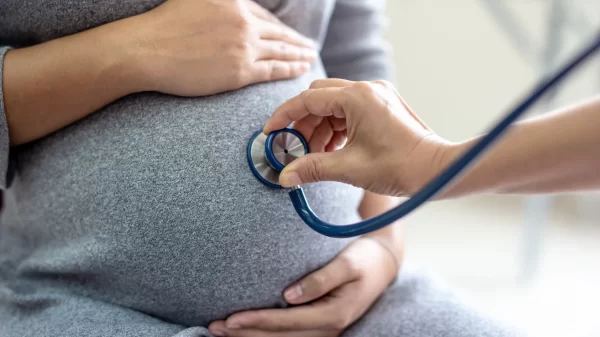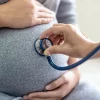In a passionate briefing with reporters on Tuesday, Dr. David Kimberlin, co-director of UAB and Children’s of Alabama’s Division of Pediatric Infectious Diseases, pleaded with the public to mask up in schools and get vaccinated as the delta variant continues to sicken more and more children and adults.
With his voice strained at times, and with clear concern, Kimberlin explained what Alabama is facing, saying the delta variant “has changed the game.” More than once during the briefing, Kimberlin — who is usually a calm presence in these COVID-19 briefings — said he realized he was being more passionate than usual.
“And it’s because I see what’s coming. What is really hitting us already, and what is about to just absolutely slam us,” Kimberlin said.
Kimberlin said the delta variant is “rapidly spreading among children” and school systems need to heed the recommendations to enact mask mandates made by the Centers for Disease Control and Prevention, the Alabama Department of Public Health, the American Academy of Pediatrics, the Infectious Diseases Society of America, the Pediatric Infectious Disease Society and a group of Alabama pediatricians who wrote a letter urging schools to require universal masking.
“I beg them to listen to the uniformity of voice here,” Kimberlin said of school systems without mandates.
Gov. Kay Ivey, who is running for re-election, has said she does not support mask mandates for schools and would issue no such statewide mask order or enact further restrictions on businesses. Some school systems have chosen to require masks, while many others have decided to make them optional for students and staff.
Kimberlin said he expects outbreaks in schools without mask mandates, and that eventually there will likely be a blanket mandate, but urged school leaders not to wait for the situation to worsen.
“It doesn’t do us very much good to launch into a school year, only to have to stop in-person learning because the viruses is running crazy throughout the school,” Kimberlin said.
“We are seeing more patients across the region, children. Pediatric patients who are admitted to children’s hospitals across our part of the country than we saw last year,” Kimberlin said. “So many more children are getting infected by the delta virus,” he said.
“If your child is 12 or over, get them vaccinated. If you have cousins that are 12 and over, strongly encourage their parents to get them vaccinated,” Kimberlin said.
There were 2,256 Alabamians hospitalized with COVID-19 on Tuesday, bringing the seven-day average of hospitalizations to 1,976. There has been a 40 percent increase to the average over the last week, a 143 percent increase over the last two weeks and a 355 percent increase over the last three weeks.
The number of people in hospitals on Tuesday with COVID-19 is the highest number since Jan. 23. On July 1, the state had just 204 hospitalized COVID-19 patients.
{{CODE1}}
Among those hospitalized with COVID-19 on Tuesday, 33 were children, according to the Alabama Hospital Association. State hospitals were caring for nine children with COVID-19 on July 15. Children’s of Alabama in Birmingham was caring for 17 children with COVID-19 on Tuesday, five of whom were in the ICU, a hospital spokesman told APR.
Over the last two weeks there were 15 children under 12 admitted to Mobile area hospitals with COVID-19, and five who were between 12 and 18, said Dr. Rendi Murphree, an epidemiologist with the Mobile County Health Department, in a Tuesday briefing.
Alabama’s seven-day average for the percentage of COVID-19 tests that are positive over the last week is a record-high 24 percent, up from 5.2 percent on July 1. Public health experts say it should be at or below 5 percent or cases are going undetected.
{{CODE2}}
Asked about parents who are concerned over a lack of mask mandates and who are considering pulling their children out for virtual learning or home-schooling, Kimberlin said “that probably is the toughest question I’m going to get today.”
“There are no good answers to it,” Kimberlin said, adding to get children 12 and older vaccinated and to reach out calmly to school leaders and urge them to order masks.
“They hear a lot from folks that are angry and loud. They do. I think that the folks that are concerned, and that are behind the type of question that you posed to me, I think they’re the majority,” Kimberlin said. “I think they’re quieter, and I think now they’re realizing that they need to be more active, and they should be more active.”
Kimberlin said the data gathered from last year is clear, that pulling children from in-person learning is detrimental to their educational outcomes, to their mental health and from the socialization standpoint.
“Right now, my default is that children, even in mask-optional districts, should go to school,” Kimberlin said. “That’s right now. I could find that to be an ill-advised comment a week from now, if things are as bad as they may be.”
Asked about comments from a pediatric nurse at a recent school board meeting who said children aren’t really getting very sick from the delta variant and “y’all are really overblowing that,” Kimberlin cautioned against listening to those lone voices as opposed to the vast majority of medical experts who realize the danger posed to children and adults.
“I have been a pediatric infectious diseases physician for 27 years,” Kimberlin said. “I have studied virology for 25 of those 27 years. I am the editor of the American Academy of Pediatrics Red Book, which is referred to as the Bible of pediatric infectious diseases,” Kimberlin said. “I’m an associate editor of the main Pediatric Infectious Diseases textbook. I am the AAP liaison, one of two, to the Advisory Committee on Immunization Practices, the committee that advises CDC on all vaccine issues including, including the COVID vaccine issues. I know what I’m talking about.”
“Now this is not a time to go cherry-picking who you want to believe,” Kimberlin said. “Go to the CDC. Go to the American Academy of Pediatrics. Go to the professional societies and listen to them. Don’t listen to the individual lone voices.”
“This virus is the real deal, and it does cause severe disease in children, and we are ill-advised to take it lightly,” Kimberlin said. “Now, will a lot of children be fine from it? Yes. Thank god, yes. Will some children not be? Yes. And do you want your child to be that one or that three or that 10? I think not.”
Kimberlin equated the need to protect the state’s most vulnerable from COVID-19, those under 12 who cannot be vaccinated, older kids and adults with medical conditions, to the Biblical teaching of caring for the most vulnerable.
“One of the things I strongly believe is that Alabamians are good people, and faithful people,” Kimberlin said. “I know that the faith-based life is how so many Alabamians, myself included, strive to live every single day. what’s more fundamental to Christianity than helping your neighbor, and doing things that protect your neighbor. That’s what we’re talking about here.”
“I know there are individual liberties. I get all that. I can make an argument that infectious diseases is separate from that, for various reasons and so on and so forth, but I also know that that scripture says that we should take care of the least among us, and that’s what we need to be doing right now,” Kimberlin said.













































